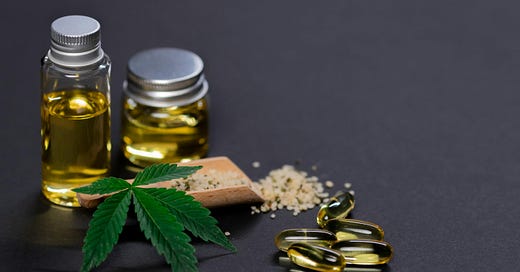Texas' Medical Cannabis Crisis: From Low-THC to High-Stakes - Why the State's 'Compassionate Use' Program is Falling Short for Texans
Texas vs. Cannabis: The Struggle for Affordable, Accessible Medicine - Why Texas’ Medical Cannabis Program Isn’t Helping Patients Like Me
I am a medical cannabis user, and I have been since before I was legally able to access my medicine in my state.
Texas does have a medical cannabis program now, but the program has many shortfalls.
Welcome back to another Founding Member Post!
Twice each month I will put out an exclusive post like this one (often on a more intimate and personal topic, book sneak peeks, OR featuring some of the training materials I’m teaching) that will be brought to you by and for our Founding Members.
When I am scheduling this post, we have thirty-five Founding Members!
I won’t put them on the spot today, but you know who you are. I can’t thank you enough for your support.
Is Texas Really 'Compassionate'? A Deep Dive Into the State’s Medical Cannabis Failures
On June 1, 2015, SB 339 (known as the Texas Compassionate Use Act), allowing some qualifying patients to access "low-THC cannabis" (which contains 10% or more cannabidiol/CBD and only small amounts of tetrahydrocannabinol/THC - 0.5%) was signed into law.
Several years later, in 2021, HB 1535 was signed into law, which slightly increased the THC cap (from 0.5% to 1.0%).
I do have more than one diagnosed condition (including being Autistic) that qualifies me for medical cannabis under the current Texas Compassionate Use Act. However, this program is imperfect for a few reasons.
One major problem with attaining medicine through our state's compassionate use program is that doctors are scarce. When the program launched, not many doctors were enrolled.
Soon after the program's launch, I emailed or called all of the doctors in my area (and surrounding areas), leaving messages asking if I could be evaluated. None got back to me to help me set up an appointment, so I continued to get my medicine through other channels.
Now, there are more doctors, but depending on where people live, there may not be a doctor (or provider who can dispense medications) for miles.

Another reason the Texas Compassionate Use plan is imperfect is that the program only offers VERY EXPENSIVE low-dose THC (with doses costing as much as $5-25 dollars per dose, depending on the delivery method and strength).
Low-THC cannabis is defined in Texas as: "a cannabis plant or derivative that contains less than 1% of tetrahydrocannabinol by weight. This differs from the definition of "hemp" in Section 121.001 of the Texas Agriculture Code, which defines cannabis plants and derivatives consisting of less than .3% tetrahydrocannabinol by weight".
Even if I could get one of these doctors to see me, I can't afford what they're selling. In addition, I personally find that I need more THC in my medicine than would be allowed within the medical program.
The 2018 Farm Bill
In 2018, something happened. The federal government passed the 2018 US Farm Bill, which legalized the sale of certain cannabis products nationally. Under the bill, products with 0.3 percent delta-9 tetrahydrocannabinol (THC) or less by weight would become legally classified as "hemp" (and legal for purchase), and products with more than 0.3 percent delta-9 THC will continue to be classified as "marijuana" and illegal.
Weed in Texas is Easy to Find These Days
Since 2018, Texas has been flooded with various hemp-based cannabis products, which are widely available in stores all over the state.
It's simple for adults to access these products recreationally in Texas, making my life easier as a medical user. To purchase these products, one must be 21 and show ID, similar to how one purchases tobacco or alcohol.
We've got many hemp dispensaries, which can be found in even the smallest rural towns.
In addition, cannabis (cultivated from federally legal hemp with Delta 8, 9, 10, and other cannabinoids) can also be found in most vape stores and many gas stations now. Although I often order online, opting for my (federal legal) medicine to come in the mail (so I can price shop for the most affordable deals).
Though my medicine is legal at the time of writing this, I worry that our local police can't tell the difference between what I buy over the counter at a local shop and illegal medicines (which all work the same for me).
Even if the cops know the difference, I doubt they would care, so I am always careful to keep the original packages and receipts for my medications anytime I travel with them. This is why, though I like flowers, I stick to pre-packaged edibles and vapes (which don't have that cannabis smell that could attract the wrong kind of attention).
It's a strange set of affairs, one plant living in a grey area of legality.
One version of the plant is legal, and the other is illegal, but both appear nearly identical to the naked eye (and to the user). It doesn't make sense, and the complications only seem set up to increase in the next legislative session (due to the presence of contradictory bills set to be heard later this month).





